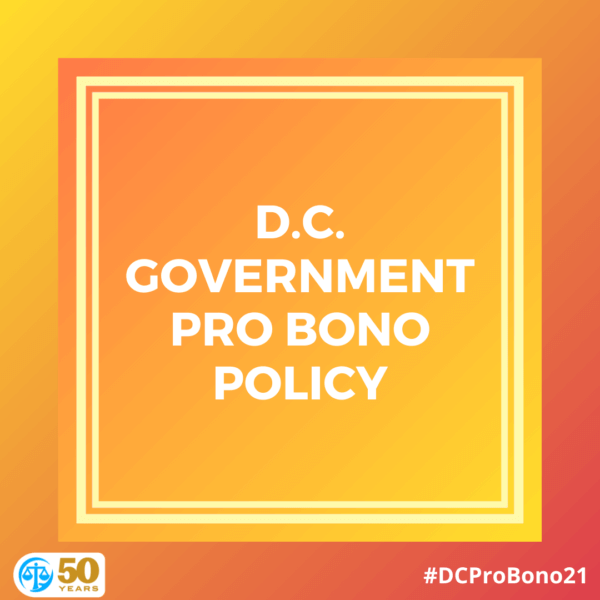
Mayor’s Office of Legal Counsel Promulgates Pro Bono Policy for D.C. Government Lawyers
By Elizabeth Symonds
Let’s admit it – for some of us, embarking on our first pro bono project can seem a little daunting. For lawyers working for the District of Columbia government, it can seem even more complicated, as seemingly countless questions can arise: Who in my office grants me permission to do pro bono work? Where can I obtain malpractice insurance? Am I permitted to use my leave when pro bono activities occur during the workday? How can I be sure my pro bono work poses no conflicts of interest?
Fortunately, now all D.C. government lawyers working in the Executive Branch have answers to these and many other questions that are addressed in the new pro bono policy promulgated by the Mayor’s Office of Legal Counsel. The Mayor’s new policy provides much-needed direction to lawyers who want to give back to their community and discharge their professional responsibilities as attorneys by participating in pro bono work. It provides a blueprint for the many local government lawyers who in the past had wanted to take on a pro bono project but who were reluctant to go forward without the necessary guidance.
The Mayor’s new pro bono policy is a welcome sequel to the pro bono policy promulgated by the D.C. Office of the Attorney General (OAG) in December 2018. Pursuant to that policy (which was drafted with the assistance of Washington Council of Lawyers), attorneys in OAG have been able to use their legal skills to volunteer with several local organizations, including Ayuda and the D.C. Bar Pro Bono Center. We are particularly delighted that the new pro bono policy states that the District government has joined the DC Access to Justice Commission’s DC Represents challenge, which represents an enhanced effort to confront the influx of COVID-19 related legal needs in the District. The Mayor’s new policy, and the District’s commitment to DC Represents, is a perfect way to celebrate D.C. Pro Bono week later this month!
We note, however, that although D.C. government attorneys may participate in essential pro bono activities such as volunteering in legal advice clinics, they currently are not permitted to represent pro bono clients in D.C. Superior Court and the D.C. Court of Appeals. We are hoping that this prohibition will soon be lifted, as D.C. Councilmember Charles Allen recently introduced legislation that would permit such representation when no other conflicts of interest exist. We are grateful to Councilmember Allen and the eight other Council members who co-sponsored Bill 24-0298, the “Pro Bono Legal Representation Expansion Amendment Act of 2021”, and look forward to the Council hearing on the bill (scheduled for October 27). When this legislation is enacted, D.C. government lawyers will be able to join their counterparts in the private and federal sectors who provide free legal assistance to clients in cases involving landlord-tenant disputes, family law, and other areas where there is an acute need for pro bono representation.
So yes, that initial pro bono project might still give you the jitters – maybe you will be meeting a client or attending a deposition for the first time, after a career of transactional legal work. But thanks to the Mayor’s new pro bono policy, D.C. government attorneys will not have to also wonder about the many logistical details governing their ability to do pro bono work – and they will know that they have the backing of a Mayor and administration that has demonstrated its commitment to access to justice by instituting a policy that strongly supports those local attorneys ready to roll up their sleeves and start to work to help meet our community’s legal needs.
Washington Council of Lawyers invites lawyers from all sectors to participate in the trainings, volunteer opportunities, and programs taking place during DC Pro Bono Week, October 24-30. Learn more, here, and follow the conversation on social media using #DCProBono21.
Elizabeth Symonds is a co-chair of Washington Council of Lawyers’ Advocacy Committee and a member of our Board of Directors.






